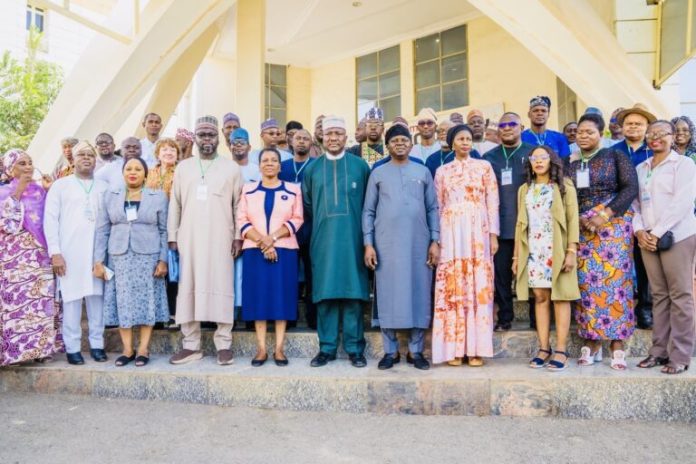News Investigators/ The Minister of Water Resources and Sanitation, Prof. Joseph Utsev, has called for greater private sector involvement in improving access to Water, Sanitation, and Hygiene (WASH) facilities in Nigeria.
Utsev made this call at the opening of the National Retreat for States on the Clean Nigeria: Use the Toilet campaign in Abuja on Wednesday.
He emphasised the government’s commitment to fostering market-driven solutions and attracting investment in sanitation infrastructure.
“We are focused on strengthening the role of the private sector in driving market-based solutions and creating business opportunities for sanitation entrepreneurs, such as Toilet Business Owners.
“We are also exploring innovative financing models and expanding Public-Private Partnerships (PPPs) to attract investment in sanitation infrastructure and services while leveraging technology and innovation”.
The minister reaffirmed the Federal Government’s commitment to ending open defecation in Nigeria by 2030, in line with the revised implementation strategy of the Clean Nigeria Campaign (CNC).
He stated that 142 local government areas (LGAs) across 20 states had achieved open defecation-free (ODF) status as of January 2025.
He however acknowledged persistent challenges, including financial and human resource constraints at state and local government levels, which have hindered progress.
Utsev urged state governments to develop clear, time-bound ODF Action Plans aligned with the campaign’s 2025–2030 strategy and to establish dedicated implementation teams to accelerate efforts.
He also announced plans to introduce a national performance scorecard to assess and rank states based on their sanitation efforts, with incentives for high-performing states.
The minister praised states making huge ODF progress, urged others to follow, and called for stronger collaboration with development partners to achieve an ODF Nigeria by 2030.
He noted that while the SURWASH initiative is currently being implemented in seven states, plans are in place to expand it following an ongoing evaluation.
The ministry’s Permanent Secretary, Mr Richard Pheelangwah reaffirmed the government’s commitment to an open defecation-free Nigeria by 2030, urging stakeholders to intensify sanitation efforts.
Pheelangwah, represented by the Director of Reforms, Mr Moses Jo-Madugu, described the retreat as a key platform for evaluating progress and strengthening implementation efforts.
“This gathering marks another significant step in our collective commitment to ending open defecation and improving sanitation across the country.
“Our goal may seem ambitious, but it is achievable through strong political will, strategic collaboration, and sustained action at all levels,” he stated.
He commended stakeholders’ commitment to sanitation and urged them to share best practices and innovations.
Pheelangwah expressed hope that the retreat would strengthen state-level commitment and accelerate the campaign’s rollout nationwide.
He assured attendees that the retreat’s communiqué would provide clear guidance for advancing the initiative at the state level.
“Achieving a Clean Nigeria goes beyond policy, it requires behavioural change, community mobilisation, and long-term solutions”.
The CNC National Coordinator, Mrs Chizoma Opara said the retreat aimed to assess its five-year progress, saying only 142 local government areas across 20 states had achieved ODF status.
Opara called for greater collaboration to achieve the goal of making Nigeria ODF by 2030.
Speaking on behalf of his colleagues, Gombe State Water Resources Commissioner, Mohammed Saidu, pledged to develop a five-year roadmap to achieve the ODF target.
Stakeholders from the Ministry of Health, WaterAid, UNICEF, and others delivered goodwill messages.
The two-day retreat gathered water commissioners from all 36 states, the FCT, and key sector partners.
A key highlight of the event was the unveiling of new information materials and a SURWASH programme logo to enhance awareness and engagement in the sector.
NAN


